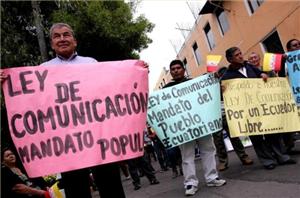Ecuador’s congress has taken away press freedom with a restrictive new media law passed, which creates official media overseers, imposing sanctions for smearing “people’s good name” and limiting private media to one third of radio and TV licenses.
The country’s privately owned media, which is largely in opposition hands, joined press freedom groups in calling the bill an authoritarian measure to control dissent.
Mauro Andino, who sponsored the bill, said the proposal would protect freedom of speech, but “with a focus on everybody’s rights, not just for a group of the privileged”.
A media watchdog will be able to impose fines and force media outlets to issue public apologies if it concludes that they defamed people, or that the information published could prompt a “violent” reaction from an audience.
Critics have called the law, which was passed by a 108-26 margin, a blow to free speech but the government has hailed it as a step towards a more balanced media.
The law represents a victory for socialist President Rafael Correa’s in his six-year battle with the country’s media, during which he sued several outlets for libel, and insulted reporters with epithets such as “wild beasts” and “rabid dogs”.
Opposition politicians, who wore gags during the debate, say the law will allow the government to control media through loosely defined regulations that require information to be accurate and balanced.
Government officials said it will make communications more democratic.
“This law is a milestone that separates the before and after in the history of communication and access to information by all Ecuadoreans,” Political Management Minister Betty Tola said.
Several rights groups, including the Committee to Protect Journalists and Amnesty International, have expressed concern that the Correa government might be trampling on freedom of expression.
“One of this law’s main flaws is the creation of a new mechanism for regulating the traditional media and their websites. Another is its attempt to influence how the profession of journalism is defined and practised,” Reporters Without Borders said on Friday.





